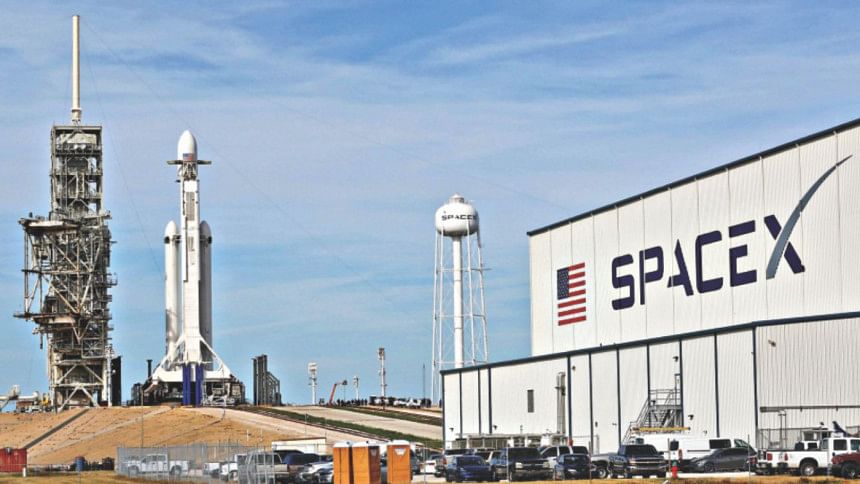SpaceX to launch the 'most powerful rocket'

SpaceX is poised for the first test launch of its Falcon Heavy, which aims to become the world's most powerful rocket in operation, capable of reaching the Moon or Mars some day.
The launch, scheduled for 1:30 pm yesterday from Cape Canaveral, Florida, is the most ambitious yet for SpaceX, and has been hailed by industry experts as a game-changer because of its potential to propel the California-based company to the very forefront of the modern day space race.
"Nasa may decide to use it (the Falcon Heavy) as a way of fast-tracking its plans to get to the Moon and Mars," Erik Seedhouse, assistant professor of applied aviation sciences at Embry-Riddle Aeronautical University, told AFP.
The launch is a "huge deal, even for a spaceflight company that routinely accomplishes huge deals," said Jason Davis of the Planetary Society, describing the Falcon Heavy as "mythical."
No people are on board, just a mannequin wearing a futuristic spacesuit, strapped into CEO Elon Musk's very own cherry red Tesla car.
"Starman in a Red Roadster," Musk posted on Instagram Monday, showing the rocket's payload on a pedestal, aiming skyward.
Musk has also said David Bowie's hit "Space Oddity" would play in the vehicle during the launch.
An animated video released by SpaceX to preview the launch showed all three rocket boosters returning to upright landings on Earth, while the car and mannequin emerged from the protective nose cone and sailed into orbit.
The car is destined for an elliptical orbit around the Sun, taking it into the vicinity of Mars.
"At times, it will come extremely close to Mars, and there is a tiny, tiny chance that it will hit Mars," Musk told reporters. "Extremely tiny."
Musk reiterated his warning that the maiden launch of the Falcon Heavy -- a project he first unveiled in 2011 -- may indeed fail. It may even explode on the launchpad.
"I would consider it a win if it just clears the pad and doesn't blow the pad to smithereens," he said.
There is also a chance the Tesla might not make it beyond low-Earth orbit. First it has to go through the violent Van Allen belt where it will be pummelled by charged particles for about six hours.
"It is going to get whacked pretty hard," Musk said.
Even if there is a disaster, Seedhouse said it is unlikely to harm the reputation of SpaceX -- already a top cargo supplier to the International Space Station under a $1.6 billion contract with Nasa and busy with a steady stream of satellite clients and government payloads.
"Last year, they had more launches than any other country in the world -- never mind any other company," Seedhouse said.
"Every failure they have had they have bounced straight back."

 For all latest news, follow The Daily Star's Google News channel.
For all latest news, follow The Daily Star's Google News channel. 



Comments